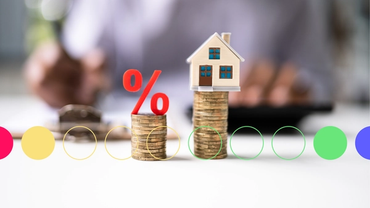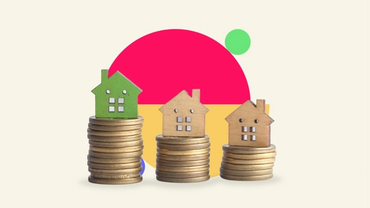How Mortgages Work | Types, Rates, LTV Rules & More
By Boring Money
Different types of mortgage
By payment type
Repayment mortgage
Quite simply, this means you make monthly payments in order to pay off the full value of your loan. So at the end of the mortgage term, you own your property outright and owe nothing more to your lender.
Interest-only mortgage
With an interest-only mortgage, your monthly payments are only paying off the interest on your loan.
You will still owe the lump sum you initially borrowed to buy the property and will need a plan to pay this off separately at the end of the term. You can do this by remortgaging the property, using money from somewhere else (such as savings), or with the money you make when you sell it.
Interest-only mortgages are much less popular since the Global Financial Crisis as lending criteria has become more strict. There are not as many of these deals on the market
While interest-only mortgages are not for everyone, they can be advantageous for older homeowners with considerable equity, as well as first-time borrowers wanting to improve their affordability.
Which is better?
There are pros and cons to both types of mortgage. If you can afford it, it normally makes sense for most people to opt for a repayment mortgage. That way you’re actually paying off the loan, and will consequently pay less interest on it over the long-term. It also means you fully own your home at the end.
However, the monthly repayments on an interest-only mortgage are often much lower. So this can help with affordability and could mean that you're able to purchase a more expensive property than you could with a repayment mortgage. This is also why those looking to buy-to-let might find that an interest-only mortgage is beneficial, as you could benefit from the comparatively lower monthly repayments and then opt to sell the property on once the let comes to the end of its term.
By interest rate
Fixed rate mortgages
The benefit of this is that you know exactly what interest rate you’re paying – and therefore exactly what your monthly payments will be – for as long the deal lasts. Most Fixed-rate deals are for a 2-5 year period, after which you can decide to fix again. Otherwise, in most cases you'll automatically be switched onto the lender’s standard variable rate (SVR).
Standard variable rate (SVR) mortgages
This is a lender’s default rate. It doesn’t have to be pegged to the Bank of England base rate, and can be increased at any time by the provider. As a general rule SVRs aren’t the best rates on the market, so you should shop around when your initial 2 or 5 year deal expires.
Tracker mortgages
Tracker mortgages are linked to the Bank of England's (BoE) base interest rate. That is to say, if the BoE's base rate is 4% and your lender's tracker deal is 2% above the base rate, you'd be paying 6% interest on your mortgage (ouch!). On the other hand, if the base rate fell to 1%, you'd only have to pay 3% interest. At the end of the term, as with other types of mortgage, you're automatically moved onto your lender's default SVR.
Discount mortgages
Here, you get a discount on the lender’s SVR. For example, if the lender’s SVR is 4.5% and your mortgage has a 1.5% discount, you’ll pay 3%. Deals are sometimes ‘stepped’ – meaning you might get a 1.5% discount for year one, but only a 1% discount for year two.
Top questions about mortgages
How long is a mortgage term?
A typical mortgage deal comes with a 25-year term. That is, at the end of the 25 years, you will have paid back the full loan (plus interest) and you will own your property outright. However, there are shorter and longer mortgages on the market, although these are rarer and usually have more strict lending criteria. You can actually get mortgages anywhere between six months and 40 years long.
For most people, the standard 25-year term is perfectly okay. A shorter term means you can pay off your loan faster (and so pay less interest overall) but often comes with higher monthly repayments. Conversely, a longer term means your monthly repayments will be lower, but you're paying back the loan for longer and so paying more interest overall.
How much can I borrow for a mortgage?
The size of mortgage you can get is highly dependent on a number of factors, including your deposit, your salary, your credit history, and whether or not you're buying with someone else.
Ultimately it's down to the individual provider to decide how much they're willing to lend to you, but as a general rule of thumb, most people can borrow between 4 to 4.5x their salary. Some lenders will stretch this to as much as 5x your salary, but this is less common.
In addition, if you opt for a tracker or variable rate mortgage, you will need to be in a position where you can afford any potential increases in your interest rate. Later on we'll share a helpful mortgage affordability calculator which can give you a good idea of how much you might be able to borrow.
How much deposit do I need for a mortgage?
To put it simply: as much as you possibly can. If you have a larger deposit, you won't have to borrow as much from the bank and your interest rate is likely to be lower. When deciding whether or not to accept a mortgage application, lenders will look at your loan-to-value ratio (LTV) - that is, the size of your deposit compared to the overall size of the mortgage. Generally, the higher your deposit, the lower your LTV. This typically translates to lower interest rates.
For example, an 80% LTV mortgage (with a 20% deposit) might have a lower interest rate than a 90% LTV mortgage (with a 10% deposit). This is because the overall loan isn't as big, as you've paid for more of the property upfront with your deposit. So you have less debt left to pay off.
Many mortgage lenders have different interest rates for different bands of LTV - usually 95%, 90%, 85%, 80% and so on. 100% (no deposit) LTV mortgages do exist, but they are rare and typically come with very high interest rates.
The difference between the interest on different LTV bands can have a big impact on your monthly repayments, so it's worth checking to see if you can save a bit extra for your initial deposit and nudge yourself down to a lower rate for the monthly repayments.
In England, the average first-time buyer deposit is a whopping £68,154, according to the latest mortgage data from UK Finance.[1] However, property in England is more expensive than other nations in the UK. In Northern Ireland, the typical first-time buyer deposit is £39,034.50, while in Wales and Scotland, buyers are stumping up £34,475.91 and £30,786.97 respectively.
Average deposit by UK region
Region | Average Deposit |
East Anglia | £66,380.79 |
East Midlands | £47,765.68 |
England | £68,154.08 |
Greater London | £151,731.11 |
Northern Ireland | £39,034.50 |
North West | £42,863.74 |
Northern England | £30,679.26 |
South East | £80,471.88 |
South West | £65,170.91 |
Wales | £34,475.91 |
West Midlands | £49,511.89 |
Yorkshire & Humber | £39,511.25 |
Source: UK Finance, September 2025.
Can you get a mortgage with bad credit?
There is no hard and fast rule that says you can't get a mortgage if you have a poor credit history. However, your credit score
is something that lenders look at when deciding whether or not to accept your application and the better it is, the better your chances of being accepted. This is because a higher credit score means you're more likely to be seen as reliable and responsible with your debt, so providers will feel more comfortable lending you a large sum of money like a mortgage.Even if you are accepted, having a poor credit score or a less-than-stellar credit history can mean that your interest rate will be higher - meaning you'll have to pay back more each month than you might have if you had a better score. There are 'bad credit' mortgages on the market for those who are concerned about a poor credit history, but these typically come with higher interest rates and often ask you to provide a higher deposit to start with.
This is why it's crucial to keep an eye on your credit score well in advance of applying for a mortgage and regularly check to see if there's any room for improvement.
Should I use a mortgage broker?
A mortgage broker can help you to scour the market for the best deal that you're likely to be accepted for and the ones that are most appropriate for you. They can also get access to loans that aren’t directly available to borrowers and can even be notified about flash sales available to those with low deposits.
You might find a mortgage broker helpful if your finances are complicated, your credit score or history is poor, or if you just want to make sure you’re getting the best mortgage deal possible. Look for a 'whole-of-market broker', meaning they're not bound to any banks, building societies or lenders and will be able to assess every deal available.
You can speak to a mortgage broker directly or opt to use an online mortgage broker instead such as L&C, Habito or Better.
Common mortgage fees
Don’t forget that you're likely to encounter many fees that come with buying a property and setting up a mortgage. Arrangement fees, valuation fees, Land Registry fees... there can be a lot! And often there are exit penalties if you want to terminate your mortgage before any agreed timeframe.
Essentially, buying a property costs a lot more than what it appears to say on the tin. Here's a breakdown of some of the main fees you may have to pay as part of getting a mortgage.
Stamp Duty
Stamp Duty, also called 'Stamp Duty Land Tax' or SDLT, is a tax you have to pay to the UK government when you buy a property or land over a certain price (called the ‘threshold’) in England or Northern Ireland. You pay a similar tax called ‘Land and Buildings Transaction Tax’ in Scotland and ‘Land Transaction Tax’ in Wales.
The good news here is that if you’re a first time buyer and your property costs less than £300k, you won’t have to pay a penny in Stamp Duty. Yay! However, it then kicks in at a rate of 5% on properties worth between £300,001 - £500,000 and notches up even further for more expensive houses. Here's a breakdown of how Stamp Duty works for first-time buyers.
First-time buyer Stamp Duty rates:
If you’re a first-time buyer, you have to pay Stamp Duty at the following rates:
Stamp Duty band | Stamp Duty rate |
£0 - £300,000 | 0% |
£300,001 - £500,000 | 5% |
Above £500,001 |
Correct as at 2025-26 tax year.
Valuation fee
As part of your mortgage application process, your lender will check the value of the property you're buying to ensure that the amount you're applying for is appropriate. They do this with a valuation survey. Some lenders don't charge for this, and if they do it's typically around £300 - but can be as high as £1.5k depending on the value of the property. Note that that a valuation is not the same as a property survey so will not identify any structural problems - it's merely to confirm that the value of the property matches up with your mortgage application.
Survey fee
This is not something to scrimp on. A house survey is an inspection of your property by a qualified expert to identify if there are any issues or concerns about the condition of the building. There are several types of survey with varying degrees of detail. You can usually take advice from an estate agent on the level you’ll need (a simple one if it’s a new build vs a more thorough one if you’re in a particularly old or complex building), or it may be intuitive to you which is most suitable for your chosen property. It's a worthwhile fee which is typically in the range of between £250 - £600 for most properties.
Estate agent fees
If you're using an estate agent to buy your property, there will be fees to pay for their services. This should be discussed upfront when you initially select your agent, but as a general rule of thumb you can expect to pay around 1-3% of the sale price of the property (plus 20% VAT). Online estate agents, such as Zoopla or Rightmove, usually charge a flat fee which can work out lower than a traditional estate agent.
Legal fees
And finally, you’ll most likely need a lawyer to work through all the paperwork for you. Their costs vary depending on the price of your property but typically fall between £500 - £1,500. If you're buying with the help of an estate agent, they sometimes offer discounts on legal fees for pre-approved solicitors that they're affiliated with.
How to get the best mortgage deal
🔎 Keep an eye on your credit score
The first step in your mortgage journey begins long before you actually make your application - with your credit score. Although there's no minimum credit score required to be eligible for a mortgage, the higher it is, the more likely your application is to be accepted. If you're not sure what your credit score is or you think you might need to improve it, head over to our guide for some helpful pointers.
🔢 Use a mortgage affordability calculator
Before you start making any applications, it's crucial to understand your budget and how much you can afford to borrow. This can be very different depending on your unique circumstances, and although the general rule is around 4.5x your salary, this isn't guaranteed. The MoneyHelper mortgage affordability calculator follows a (very) simplified version of the checks that your prospective lender will do on your finances before deciding whether or not to lend to you, by assessing your income and outgoings - and those of your partner if you're getting a joint mortgage.
💰 The bigger your deposit, the better
If you're a first-time buyer, saving up a deposit is often the trickiest (and most time-consuming) part of the process of buying a property. However, as painstaking as it can be, having a bigger deposit can make you eligible for better deals. Usually the minimum deposit you can apply for a mortgage with is 5%, but these deals are few and far between. Most lenders start from a 10% deposit, and the very best deals tend to be available for those with 20%.
💯 Compare the best deals online
Now that you've got a rough idea of the size of mortgage you could be eligible for, a price comparison website can help you to get a bird's eye view of the market and see the lowest rates on offer. Whether you're a first-time buyer, remortgaging or looking for a buy-to-let mortgage, it's vital to shop around first before you commit hundreds of thousands of pounds to a contract. Remember however that these sites can't tell you which mortgage is truly best for you, they merely show you the most competitive rates on the market at any one time.
---



